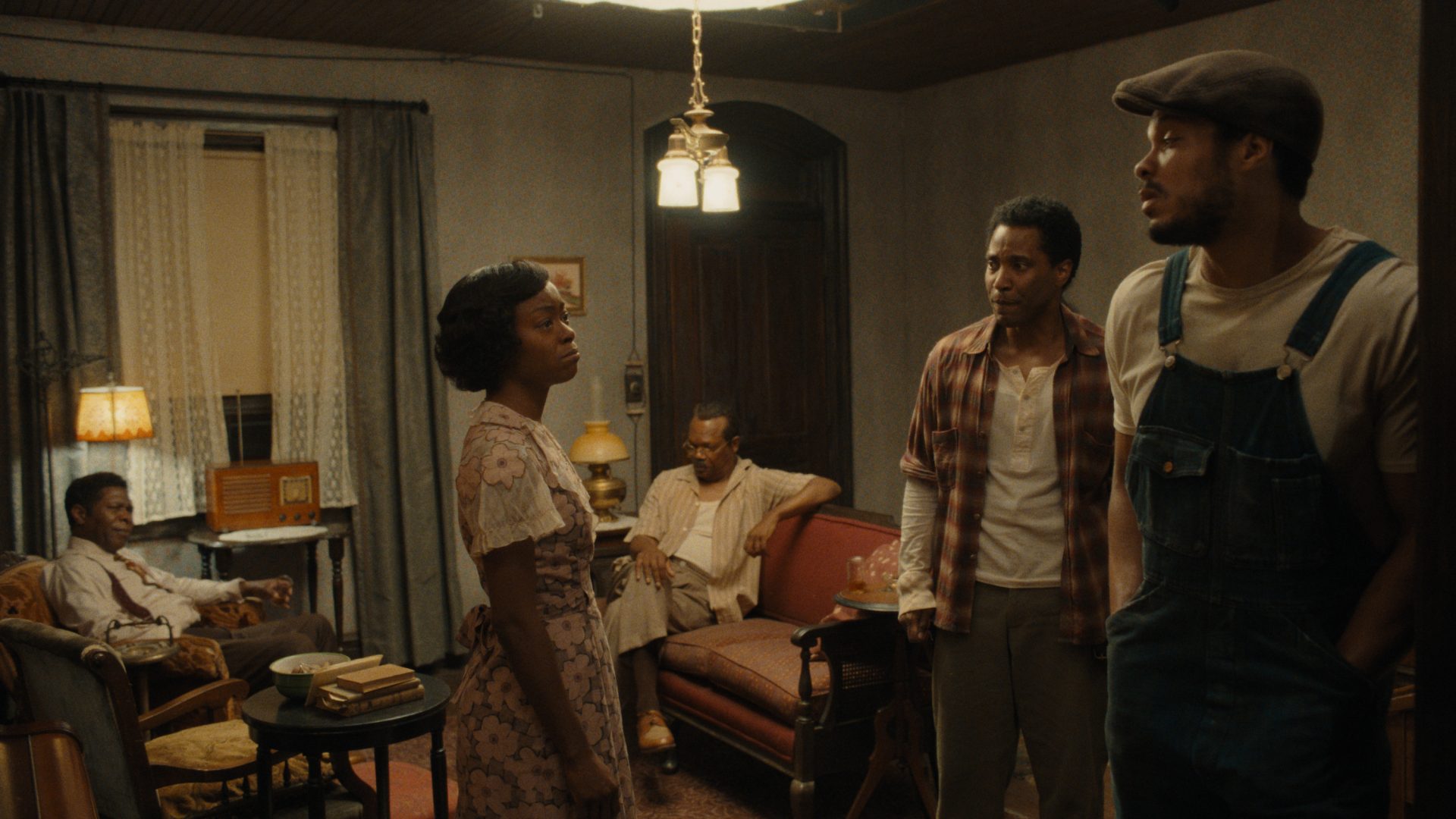After Fences (2016) and Ma Rainey’s Black Bottom (2020), this is the third movie adaptation drawn from August Wilson’s legendary ten-play Century Cycle to be produced by Denzel Washington. It’s a family affair, too, as his eldest son John David stars as Boy Willie, while his youngest, Malcolm, directs. His daughters Katia and Olivia are also part of the troupe, as executive producer, and as Young Mama Ola respectively. It is a sensationally good film.
Pittsburgh,1936: Boy Willie and his friend Lymon (Ray Fisher) arrive, after a long drive from Mississippi, at the home of Uncle Doaker (Samuel L. Jackson), bringing with them a truckload of watermelons, which they intend to sell, and keen to see Boy Willie’s sister Berniece (Danielle Deadwyler, excellent).
The plan is to trade the family piano so that Boy Willie can buy a plot of land where their enslaved forebears once worked. As appealing as this idea may be, Doaker observes drily that “Berniece ain’t gonna sell that piano”. On its polished wood surface are carved images of their ancestors. For Berniece, it represents reverence for dynastic suffering. For Boy Willie, its value lies in the entrepreneurial future it could make possible.
In spite of the Pennsylvanian setting, The Piano Lesson owes much to the Southern Gothic aesthetic: upstairs lurks the malevolent ghost of slaveowner James Sutter (Jay Peterson), a disruptive and frightening embodiment of a terrible past.
In its oscillation between the supernatural and social realism, the movie is compelling from start to finish, an intense family drama that is also a searching exploration of trauma and its cascade from one generation to the next.
Picasso: printmaker (British Museum, until March 30)
Though it was painting that sealed his place in history, Picasso was as happy working on paper as canvas. Etching, lithography, sugar aquatint, drypoint, linocut: he mastered every technique and, as this terrific exhibition shows, produced prints from his arrival in Paris until his final years in Mougins in the south of France.
From “The Frugal Artist” (1904) – described by his lover and model Fernande Olivier as “an intense expression of poverty and alcoholism” – via early experiments with cubism to the neoclassical themes of his Vollard Suite (1930-1937), the artist’s range, daring and dynamism were always spectacular. In the minotaur, he found an alter ego that channelled primal strength, Bacchic pleasure and sexual menace.
In the 347 Suite, produced in 1968 (five years before his death), there is much wit and irreverence, not least in the caricature of a half-naked De Gaulle and a mischievous self-portrait of the ageing artist, his wisps of hair matched by a cheeky smirk.
The homage to old masters, especially Rembrandt and Manet persists, as does the braiding of the classical and the topical. Even at the age of 86, Picasso was quite equal to producing six or seven prints in a day. Catherine Daunt’s curation of 100 from 2,400 such works cannot have been straightforward, but her adroit selection provides an exhilarating insight into an entire century as well as its greatest artist.
The Listeners (iPlayer)
Adapted by Jordan Tannahill from his 2021 novel, this four-part BBC drama traces the disintegration by stages of Claire (Rebecca Hall), a teacher who begins to hear a low, constant humming. Initially supportive – and then much less so – her husband Paul (Prasanna Puwanarajah) accompanies her to medical appointments where she is given a clean bill of health.
Has she gone mad? For her teenage daughter Ashley (Mia Tharia), what starts as an embarrassment – she goes to the school where her mother works – becomes deeply upsetting. One of Claire’s students, Kyle (Ollie West), reveals that he can also hear the hum. It is a measure of how unmoored she has become that she finally agrees to accompany him on long drives in search of the sound’s origin – flagrantly breaking a basic rule of her profession and jeopardising her career.
Like all the best speculative fiction, The Listeners plunges its characters into an exceptional setting to explore universal dilemmas. Claire and Kyle are welcomed into a support group led by Omar (Amr Waked) and Jo (Gayle Rankin) that soon exhibits the more sinister characteristics of a cult. Claire is encouraged to consider the hum a gift rather than an affliction and to embrace its potentially transcendental power.
Though she notionally longs for normality to be restored, there is undoubtedly part of her that yearns for chaos. “Our life is good,” she tells Paul, “but it’s also small”. Anchored by Hall’s exceptional performance, this unsettling drama is all the better for its refusal to offer glib answers to the profound questions it poses.
We Who Wrestle With God: Perceptions of the Divine, by Jordan B. Peterson (Allen Lane)
It is almost five years since the great Roger Scruton died. Today, there are four conservative intellectuals with whose work informed progressives need to be familiar: Rod Dreher (who recently published a magisterial book on mystery in an age of secularism); Patrick Deneen; Douglas Murray; and – drum roll – Jordan Peterson.
Since breaking out in 2016 as a YouTube phenomenon, the Canadian psychologist has become one of the world’s most influential public intellectuals: an implacable enemy of “wokery”, a prolific podcaster, filler of stadiums and proclaimer of rules for life (“Stand up straight with your shoulders back”; “Treat yourself like someone you are responsible for helping”; “Do not bother children when they are skateboarding”).
His new book is, in a sense, a return to his Jungian roots, searching the first five books of the Bible, plus Job and Jonah, for their deepest allegorical and archetypal lessons. Along the way, he channels Mesopotamian and Taoist wisdom, Dostoevsky, The Simpsons, The Lion King, Despicable Me and much else.
Embedded in the thickets of his exegesis is a clear world view: “as we hover with the divine over primordial waters”, we need the wisdom of scripture “to keep our technological presumption under control” and to restrain “the pathology of compassion, extended pridefully beyond its purview”. Adam gets a kicking for striving “falsely to impress his mate” Eve and making “eternal rationalizations”.
At 503 pages and without the mercy of an index, We Who Wrestle With God is twice as long as it needs to be and often prefers dizzy portentousness to clarity. Is the divine real? “It is real insofar as it establishes the benevolent and intelligible cosmic order, that infinite place of sinful toil or cosmic play.” Well, glad we cleared that up.
All the same, it is foolish to dismiss Peterson, as so many liberals do. He has a huge global audience, and his vigorous offer of “adventure and meaning” has obvious appeal. Progressives need to ask why so many buy what he is selling. Speaking of which: the book concludes with the promise of a second volume, focusing on the New Testament. I’ll keep you updated.
Landman (Paramount+)
Another week, another Taylor Sheridan series. Yellowstone is back on our screens and is joined now by this promising vehicle for the greatness of Billy Bob Thornton – well cast as Tommy Norris, enforcer and fixer for an oil-drilling business on the west Texas Permian Basin (“the patch”).
From the opening scene, in which Tommy is hooded and facing evisceration by a Mexican cartel boss, you get the feeling that this is a career choice with more downs than ups. He describes himself as “a divorced alcoholic with $500,000 in debt – and I’m one of the lucky ones”.
With part of his finger blown off after a rig explodes, he initially declines medical assistance: “I want a cigarette and a Dr Pepper”. In the midst of another drama, his ruthless billionaire boss Monty Miller (Jon Hamm) reminds him furiously that “our business is one of constant crisis interrupted by brief periods of intense success”.
As if Tommy didn’t have enough problems, his son Cooper (Jacob Lofland) has ditched his geology degree and wants to make it as a roughneck on one of his father’s crews; while his daughter Ainsley (Michelle Randolph) comes to stay at the house he shares with two other oilmen, seeking paternal solace as her love life lies in tatters.As always with Sheridan’s productions, there are plenty of swings at the coastal elites supposedly ruining the American heartland (“D’you just order a fucking latte?”; “Don’t you dare pretend that I offend you”; “No time to grieve, no time to mourn, because banks don’t wait”). But Landman is less political polemic than a sand-blown celebration of Thornton’s star power and wit; and, as such, is very entertaining indeed.




